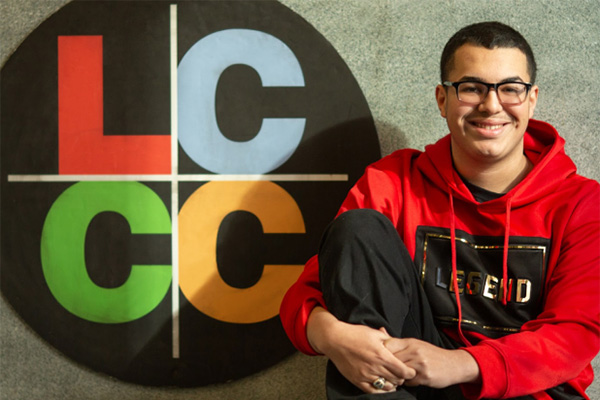Transitions Program Gives Valuable Experience to Parkland and LCCC Students

The main goal of any class is for the students to learn.
But in the Parkland Transitions program held at Lehigh Carbon Community College, the college’s teacher education students learn just as much as the Parkland students they are mentoring.
“We want the Parkland students to have positive experiences with peers their age, while providing our LCCC students the opportunity to get comfortable in a leadership role that will benefit them as future educators,” says Everett Deibler, learning specialist at LCCC.
The Parkland Transitions program is for special education students ages 18 to 21 who have graduated from Parkland High School. Through classroom experiences and real-world assignments, students learn communication and self-advocacy skills, as well as more tangible life skills like business math, meal prep and map navigation.
“Learning to transition between high school and adult life is different for these students,” says Dave York, a special education teacher at Parkland and the main teacher for the Transitions program. “School is regimented, but there’s no set rules in adult life. So I teach them skills like ethics and manners for circumstances they would encounter as an adult, like when it’s appropriate to use their phone, or go to the vending machine.”

Skills to Succeed
Transitions programs are common in high schools, but an ongoing, in-depth partnership like the one between Parkland and LCCC is unique. Before it was established in 2012, York taught Transitions classes at Parkland High School, but says the setting wasn’t age-appropriate for students who had already graduated. Plus, the students weren’t moving into life situations as the rest of their graduating class had done.
Now that the program is held at LCCC, students are exposed to an environment that lacks the structure of class bells and hall passes, requiring more self-sufficiency and decision-making.
“The biggest benefit is that they feel like they’ve moved on, they’re interacting with students their own age.” York says. “We work on a lot of community living skills. Students interact with their peers and start to make meaningful friendships.”
At the same time, the program provides valuable experience for LCCC teacher education students who are training for careers in education. The LCCC students serve as peer mentors for the Parkland students, and provide an additional level of support and encouragement.
As part of the program, students attend up to three sessions per week at LCCC’s main campus in Schnecksville. Two of those days are typically in a classroom setting, with York teaching them the life skills they need as adults.
“We work on consumer math, as well as how to read directions,” York says. “For example, we use the LCCC campus map and they learn how to tell someone where they are. We also focus on using directional words, or identifying landmarks. Everything we do, I try to relate to real-world situations.”
Being in the campus environment on a regular basis also gives students the opportunity to learn among other students their age.
“At LCCC, students have the opportunity for more challenges,” Deibler says. “They can learn skills just by going to the bookstore or talking to an instructor. Even navigating the campus is a big deal. There’s so many things LCCC offers on this campus. It’s a safe environment for any student to learn the skills they need to be an adult.”

Experience for LCCC Students
While Tuesdays and Thursdays are primarily classroom time for the Parkland students, Fridays are dedicated to working with the LCCC teacher education students, who act as peer mentors.
“These interactions help with their social skills. The students and the mentors are almost the same age, which helps them feel more comfortable,” says Kaylee Sam, a teacher education student who participated in the Transitions program for two years. She graduated from LCCC in December 2019 with an associate degree in special education and plans to transfer to Kutztown University to continue her studies.
Students in LCCC’s Introduction to Special Education course are required to complete observation hours, and the Transitions program counts toward that requirement.
“I love the program because it gives teacher education students exposure to teaching young adults with exceptionalities, which many students do not have prior to becoming preservice teachers,” says Jane Ammon, the course instructor. “This challenges our students to think deeper, as well as teaches them how to communicate effectively.”
At the start of the semester, the Parkland students and LCCC mentors meet and collaborate on a schedule of activities for the semester. The exercise gives everyone the opportunity to learn effective communication and compromise.
“Our students are getting that beginning experience of what it’s like to teach, and then we have a discussion about it afterward,” Ammon says.
Fridays are typically less structured than Tuesday and Thursday classroom days, and the sessions highlight different skills, like teamwork while playing basketball, or cooking breakfast. In this more casual atmosphere, LCCC mentors support the Parkland students as they learn social skills and confidence, while the LCCC students explore the skills they need to be teachers.
A recent Friday project brought together the students and mentors to create a free-form painting, which is now on display at LCCC’s Rothrock Library. The project, facilitated by Disability Equality in Education, encouraged the group to be creative while practicing teamwork and social skills.
“It’s fun. I get to see my friends and talk and socialize. I like doing different activities,” said Adam Mikolajczyk, a 19-year-old Parkland student.
The LCCC mentors participated, too, adding their own artistic flair while encouraging the Parkland students to participate and be creative.
“We want to give our education students some real, authentic experience. They are interacting with students and learning from professionals in the field,” Deibler says. “That kind of experience is really important for students to decide for sure whether to go into education, and to see if special education is something they want to pursue.”

